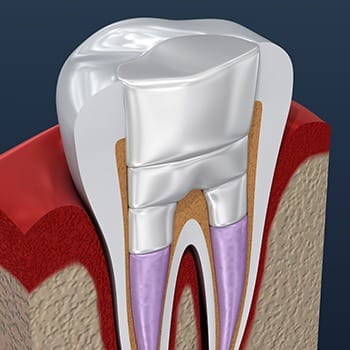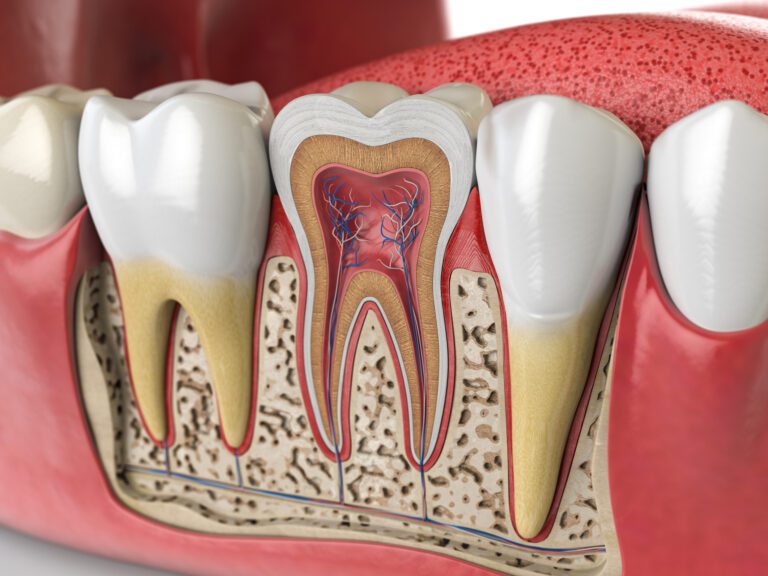How We Stop Hurting Teeth
Are you stuck at home with a severe toothache right now? If so, then you likely have an infection in the dental pulp, which is the delicate nerve located on the inside of every tooth. This can be the result of longstanding decay or even a crack in the enamel, but in either case, the best solution is likely a root canal. Thanks to Dr. Shwarts’ experience and commitment to pain-free dental care, patients can trust they’ll only experience relief if they need this procedure. Are you ready to get out of pain right away? If so, give us a call today to schedule an appointment.

Why Choose Shwarts Family Dentistry in Dallas for Root Canal Therapy?

WHAT IS A ROOT CANAL?
It is the goal of Dr. Shwarts to help his patients keep their natural teeth. No matter how severely damaged or decayed, if it is possible, he will take every measure and precaution to ensure your natural teeth stay in place. Unfortunately, that’s not always the case, and a tooth extraction is the only reliable and effective treatment. However, if there is even a shred of hope that a root canal in Dallas can save your tooth, you can expect him to act.
Whether the pain and infection are caused by poor oral hygiene or a tooth-related injury, a root canal is necessary when severe decay or damage has reached the inner portion of the tooth. Made up of several layers, your tooth’s innermost layer is called “the pulp.” When this becomes infected, it is imperative that your dentist cleans it out and restore your tooth with a dental crown to protect it from further infection.
WHO IS A GOOD CANDIDATE FOR A ROOT CANAL?
Individuals who have any of the following can expect Dr. Shwarts to recommend a root canal:
- Severe decay
- Cracks or chips in the tooth
- A faulty dental crown
- A weakened tooth caused by multiple dental procedures

WHAT TO EXPECT DURING A ROOT CANAL
If you come to see Dr. Shwarts with an aching tooth, he’ll perform an exam, and if he determines that you need a root canal, the treatment will involve the following steps:
At a follow-up appointment, Dr. Shwarts may choose to rebuild the tooth further with a dental crown. Because he uses the latest techniques and analgesics, most patients report feeling practically nothing during the procedure and enjoy immediate relief.
- He’ll start by numbing the tooth and surrounding gums using a local anesthetic
- Once you can’t feel anything, he’ll make a small hole in the enamel
- He’ll remove the infected pulp
- He’ll gently clean the inside of the tooth and sanitize it
- The tooth will be filled and then covered with a restoration
THE OVERALL BENEFITS OF A ROOT CANAL
The most noticeable benefit is the feeling of relief. Many people have the misconception that root canals are painful, but in fact, it is the infection that is causing the pain. A root canal actually removes that particular feeling once the infection is cleaned out.
Other benefits of having a root canal include:
- Saving your natural tooth from extraction and future dental work
- Less uncomfortable than a tooth extraction
- The tooth restoration looks natural, so your smile maintains a beautiful appearance


AFTERCARE TIPS
After receiving root canal therapy, there are a few tips you should follow to ensure you heal properly:
- Take any antibiotics or pain medicines as instructed.
- Be aware that you will have some sensitivity immediately after surgery. This is due to inflammation.
- Avoid chewing on the side of your mouth that had surgery.
- Continue to maintain a good oral hygiene routine but be gentle with the injured tooth.
UNDERSTANDING THE COST OF ROOT CANALS
In many cases, root canal therapy can offer your compromised tooth a much-needed solution that’s sure to restore its health and vitality at an affordable price! Here at Shwarts Family Dentistry in Dallas, our team can work with you to ensure that you’re able to maximize your benefits, lower your out-of-pocket expenses, and get your smile the urgent care it needs! Keep reading to learn a little more about the costs of root canal therapy, or feel free to give us a call for additional questions or to schedule a visit.


Our team will need to examine your dental situation before we can determine the expected cost of your root canal. A few of the main factors that contribute to the overall cost include:
- The location of the tooth – Damaged back teeth (molars) are often more expensive to treat with root canal therapy, since they have more roots that need to be treated compared to front teeth.
- The complexity of the issue – Depending on the amount of work required, a specialist might need to be brought in for your procedure which can contribute to your final bill.
- Other necessary treatments – There’s a good chance you’ll also require a restoration such as a dental crown following your root canal; other necessary treatments will also influence what you end up paying.

It might seem like having a damaged or compromised tooth extracted is the cheaper route—but despite the lower initial cost of having a tooth pulled, you’ll likely face several more long-term expenses in exchange. Even just one missing tooth can greatly increase your risk of issues like tooth decay, gum disease, and further tooth loss, all of which can be expensive to address! In this way, root canal therapy helps you to avoid costly future complications; it’s always going to be more cost-effective to save the natural tooth versus replacing it!

Root canal therapy is usually considered a major procedure, and it’s common for dental insurance plans to cover anywhere from 50% to 80% of the cost once your deductible has been met. Of course, since every dental insurance plan is different, it’s important to confirm your coverage with your provider beforehand. Our team is happy to help you with this part of the process to make sure you’re getting the most out of your coverage!

Even if you don’t have dental insurance, there are still a few ways you can make root canal therapy less of a financial burden. We’re committed to providing an elite level of care that will fit within your budget, and we’re proud to offer financing that can break up the cost of your care into smaller monthly installments that ease the burden on your bank account. We also offer an in-house membership plan that can cover the cost of root canal therapy, among other types of care. If you have any questions about how to make your upcoming root canal more affordable, don’t hesitate to call us for assistance .

ROOT CANAL FAQS
No one is thrilled to hear that they need root canal therapy, but there’s no need to dread your upcoming treatment. In fact, thanks to modern dental technology and techniques, this tooth-saving procedure is faster, more efficient, and more comfortable than ever! Below, we’ve gathered some of the most common root canal FAQs in Dallas to help put your mind at ease.
If Dr. Shwarts recommends root canal therapy, we highly recommend that you don’t put it off any later than you have to. It’s natural to want to avoid your treatment if you’re nervous, but doing so will only allow the issue to get worse. Eventually, leaving broken or infected teeth untreated can pose a threat to the rest of your teeth, your jawbone, and even your overall health. Instead of putting your smile and health at risk, schedule your root canal therapy as soon as you can.
While an intense toothache is the most common tell-tale sign that root canal therapy is needed, it isn’t present in every case. Sometimes, you may experience little to no dental pain even if your tooth is severely infected or in danger. The bacteria may have attacked and damaged the nerve of the tooth, which would prevent you from feeling anything. Even if your tooth isn’t painful, it could still be harboring a serious infection.
There’s no reason to put off your root canal therapy until after your baby is born. The American Dental Association, the American Congress of Obstetricians and Gynecologists and the American Academy of Pediatrics all encourage women to get the dental care they need while pregnant. Studies have found that the numbing medications used during your treatment are safe for both you and your baby. Be sure to let us know beforehand that you’re pregnant so we can ensure you’re as comfortable as possible.
If you struggle with anxiety when faced with your routine dental checkups and cleanings, it may feel nearly impossible to overcome your fears to get more in-depth care when you need it. Dr. Shwarts wants to make caring for your smile as stress-free as possible, which is why he offers sedation dentistry options such as nitrous oxide and oral conscious sedation. Either of these safe and reliable methods can help you sit back and relax while we relieve your pain and get your oral health back on track.
Many patients incorrectly assume that it’s easier to simply have a problematic tooth removed altogether instead of repairing it. Extracting a tooth may seem like a straightforward solution, but it leaves behind a gap in your smile that needs to be filled to prevent complications later. While there are plenty of tooth replacement options to choose from, nothing compares to your natural teeth. That’s why we do everything we can to preserve as much natural tooth structure as possible while treating your smile. Repairing your tooth with root canal therapy is almost always a better choice for your smile in both the short and long term.
Do you still have questions about root canal therapy? We’re here to put your fears to rest. Give us a call today to learn more about this tooth-saving procedure.
WHAT OUR PATIENTS SAY
"
I’m a big scared person at the dentist. But I have never never felt more comfortable, given thorough information as to my care plan and overall treated with respect and care Best experience ever😊👍. Highly recommend …
"– Nola G.

